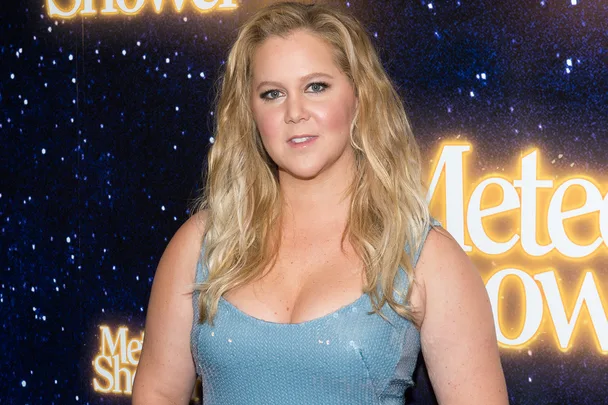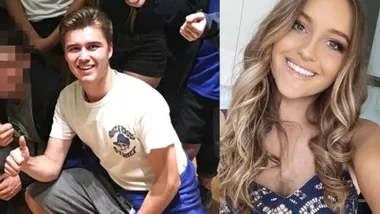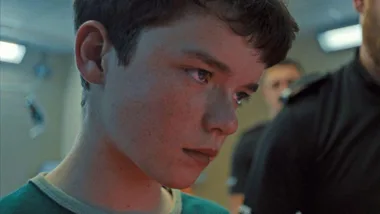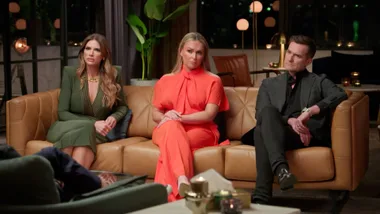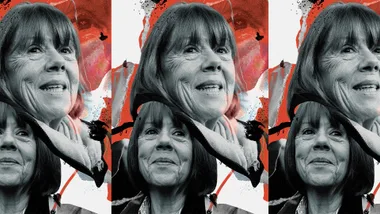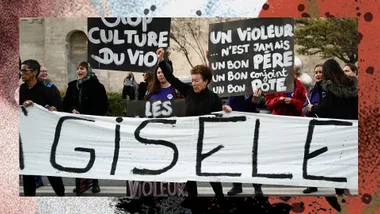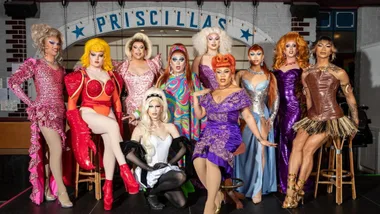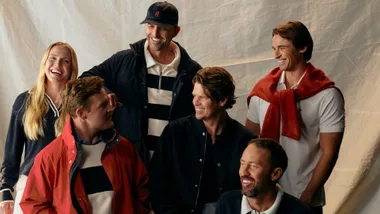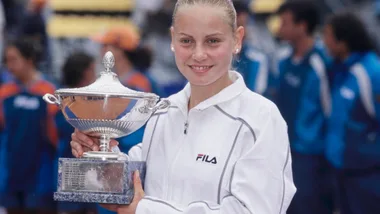On looking hot
JACKIE FRANK: What is it like being a woman in Hollywood up against the expectation of what we should look like?
AMY SCHUMER: I luckily live in New York, but in terms of the expectation, I think it’s changing a little bit. I hope I’m doing my part, but people do hold you in the same standard as a model, even if you’re a comedian. It just seems insane to me. You know, I’m funny – that’s my thing – but there’s still an expectation to [look hot]. People want all women to be gorgeous and to be skinny, but that ain’t me. I’m myself and I’m very comfortable in my own skin, [so] take it or leave it.
JF: Which part of your body would you say you love the most?
AS: Oh, I love my body. I love my breasts. I love my arse. I love my vagina. I love my legs. I love my arms. I love my ears. I love my toes. And they all move and are healthy, [so] I’m grateful.
JF: What would you say to women about accepting their bodies? We’ve got eating disorders, but also obesity is a serious health issue …
AS: There are so many different reasons people develop eating disorders, but I think it’s a complete epidemic of girls just feeling ashamed and hating their bodies and being told this “one” way of looking is the right way. And if you don’t, [then] you should be ashamed and you’re ugly and you’re not deserving of love. I’m just here to say that’s not true!
J F: So is our value then, as women, still largely attached to our appearance?
AS: A large part of our value is attached to appearance. You’ve got to watch my 12 Angry Men episode because it’s all about that. We’re judged by that, always. A woman could cure cancer, but people will still say, “Oh, but did you see her?”
JF: For men, that just doesn’t happen. They don’t get scrutinised the same way …
AS: Yeah, it’s bullshit. It sucks. But it’s a total reality, but I really am trying to do my part to change that. I think other people [are], too.
JF: Like who?
AS: Gloria Steinem is a big role model for me. Julia Louis-Dreyfus, Tina Fey, Patricia Arquette … they fight for what they really care about and are just unwavering in their goals. I think they are cool-as, strong chicks that I’d also like to have a beer with.
The path to the top
JF: What was your first stand-up gig like?
AS: I’d been performing in different plays since I was five so I didn’t have stage fright. I tried it just out of college when I was 22 or 23. It went pretty well so I stuck with it. I got obsessed with it more and more and kept working at it until I got better.
JF: You got your big break after appearing on Comedy Central’s Roast Of Charlie Sheen. It was one thing to get up there and joke about Sheen, but on that show you mocked former heavyweight cham pion boxer and convicted rapist Mike Tyson – to his face! How did you have the guts to do that?
AS: I found out pretty late in the game, about two weeks before, that I was going to be doing that roast. And that night I just went up and do what I do. I just worked really hard on my jokes.
JF: So does anything scare you, then?
AS: No.
JF: You’ve just finished the third season of your TV show, Inside Amy Schumer. It’s been described as a brashly feminist show. What does feminism mean to you?
AS: The definition to me is someone who supports the quality of political and social freedom and equality for women. I mean, who doesn’t think that women should be equal? I just think it’s a crazy thing for anyone to say they are not a feminist.
JF: Here at marie claire, we love the “Last Fuckable Day” skit, and the Friday Night Lights rip-off about footballers no longer being able to rape women. What’s your personal favourite?
AS: It would be the one my sister [Kim Caramele, a comedy writer and producer] wrote for the second season. In it, I get a big voiceover job, but then realise I am playing a meerkat. All the other meerkats are really hot, but then I see my character and she’s this severely obese meerkat, doesn’t have any pants, like, has an exposed vagina, and my character’s only line is, “Worms!” I really like those types of scenes where [people appear] so confident, but are then hit with the reality of their situation.
Filming sex scenes
JF: Your new film is called Trainwreck. It’s about a woman who thinks she has it together with her no-strings-attached lifestyle, but then hits rock bottom. How close is this scenario to the real thing?
AS: I would say 70 per cent is real. My dad really has multiple sclerosis and is in a hospital and my sister is married and in a really good marriage [like the characters in the film]. And I definitely have done my share of drinking. But honestly, I’ve only had one one-night stand, unfortunately …
JF: Only one?
AS: That’s right. That is a fact.
JF: Oh my goodness, but you have so many in this movie! What was it like for you shooting the sex scenes?
AS: They are hard to film. They were all very different, but funny. I’m so glad they came out the way they did. It was harder to film the “serious” sex scenes, even though they were still kind of crazy.
JF: There is such a double standard around women and sex, isn’t there?
AS: The guy who performs before me on the road, he talks about sex a lot. But no-one would leave the show feeling, “Wow, that guy has got around.” And he has probably had about 100 one-night stands. And I’ve slept with 25 people, and I think that number is low. But for a woman, people might say, “Wow, that’s a lot.” And I’m like, “No, it’s not.” I feel no apologies for that. [Personally] I think if someone is sleeping around a lot, she is not in a good place mentally and I think the same for a guy. But we have every right to express ourselves sexually and I think women feel kind of vilified for being someone who wants to have sex, and that’s crazy.
looking to the future
JF: You have spoken about how women often start sentences with “sorry”, and that you’ve made a conscious effort not to do that. How’s that going?
AS: I’m good about not doing that anymore.
JF: Why do you think we do that?
AS: Because people hate us (laughs). No, because women in a lot of environments are made to feel like they should just be wallpaper, and keep their thoughts to themselves. I think it’s a very ugly truth.
JF: You mentioned Gloria Steinem, but thanks to yourself and Lena Dunham, younger women have really embraced this idea of, “This is who I am, I’m going to be loud and passionate and not be apologetic about it,” which is fantastic. But even so, I would say that society is much slower in catching up. How do men respond to you?
AS: I would say 50 per cent of the men I have any dealings with are super pro-women and want to empower women in their work. But every week I’m at a different theatre or [studio] and 50 per cent of them still want to hold on to the old model. But I think women using their voices more and being aware and not apologising [are things that] they can do personally. Then those women will have children and their children will follow suit. I think we learn from examples in our home. My mum was a definite feminist.
JF: What do you say to young girls today who think the fight for feminism has been won? Often, they are not conscious of inequality until they realise they are not being paid the same as men …
AS: I would say that it’s good they don’t know that yet, [but] when this stuff does come to light for them, that they should do their part. Whatever their potential is – whatever they have in them to further the cause – I hope they do it.
JF: You worked with Judd Apatow on Trainwreck, and we’re going to see you team up with Paul Feig [director of Bridesmaids] on a mother-daughter com- edy movie. Where do you go from here?
AS: The cemetery (laughs).
JF: No, you have too many women to empower!
AS: I know. I’ve got a lot more work to do. I want to collaborate with a lot of women; I’m going to write a book; I’m going to do another season of my show and hopefully do more movies.
JF: You are living the dream. Do you occasionally pinch yourself?
AS: Yeah, I really do.
